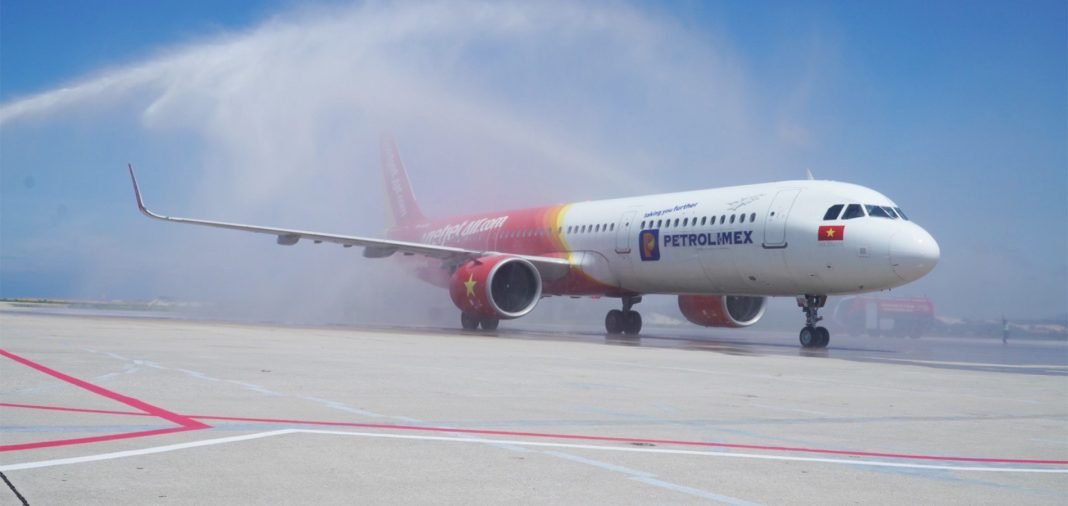Vietjet Aviation Joint Stock Company (HoSE: VJC) has held the 2022 Annual Shareholder Meeting to review its resilient business performance against the pandemic, the last five-year term of the Board of Directors, and to vote on the 2021 audited financial statements and the development plan for 2022.
The global aviation industry has faced the unprecedented most challenging time in its long history. Vietjet, though, has emerged from the pandemic with its pioneering spirit, patience and robust inner strength.
Vietjet was reported to gain consolidated revenue of VND12,875 billion (approx. US$555 million) in 2021 with the after-tax profit of VND80 billion (approx. US$3.4 million). As of December 31, 2021, Vietjet’s assets totaled nearly VND51,654 billion (approx. US$2.22 billion). Its debt-to-equity ratio stayed at 0.9 while the liquidity ratio was at 1.6 – all were considered good indicators in the aviation industry.
In 2021, Vietjet has bounced back and expanded its flight network, offering the people more opportunities to fly and shoulder to shoulder with localities contributing to the country’s economic recovery. The airline last year has operated 40,000 flights, transporting more than 5.4 million passengers across over 50 routes. It has also airlifted more than 63,000 tons of cargo, reporting a revenue growth of 200% YOY.
The airline has operated several flights to airlift doctors, police officers and soldiers to pandemic-stricken localities; delivered millions of Covid-19 vaccine doses and joined hands of strategic partners in Sovico Group to grant medical utilities including ambulances, breathing machines, testing kits, and hospital beds to cities and provinces.
By the end of 2021, Vietjet has a fleet of 76 aircraft flying to 44 domestic and 95 international destinations.
To prepare for the post-pandemic recovery, Vietjet has signed a strategic partnership agreement with Airbus on the deliveries of aircraft orders and mutual cooperation to develop the airline’s wide-body fleet in addition to further support post-pandemic.
Vietjet has invested in a wide-body fleet of Airbus A330-300 following the low-cost model, beginning a new era of longer range flight routes.
Vietjet and Boeing recently have also reached an agreement to continue their order contract with long-term cooperation programs aiming to make Vietnam into a regional and global aviation center.
Shareholders at the meeting have passed a resolution on business plan for 2022, in which Vietjet eyes to expand its fleet to 82 aircraft, operating 100,000 flights and transporting 18 million passengers.
The shareholders have also voted to pass a resolution to pay a 20% stock dividend from accumulated undistributed profits from the years before the pandemic.
The airline this year plans to earn more than VND22,300 billion (approx. US$959.29 million) in air transport revenue and make a profit.
Vietjet since its first days have pioneered in the use of e-tickets to replace paper ones and the implementation of e-commerce. In 2022, Vietjet is set to keep broadening its application of advanced technology, automation and innovation; bolstering the digital business sector in air transport, cargo and logistics; and growing and expanding air services including ground handling, training, financing, project investment and other services.
Vietjet has rolled out the SFC02 including solutions to optimize the fuel consumption in aircraft operation, reducing environmental pollution. In the coming time, the airline will continue the program to monitor and manage the fuel consumption and CO2 emission of civil aircraft, aiming towards emission reduction and climate change prevention.
Recognizing 2021 was a challenging year for the aviation industry, Transport deputy minister Le Anh Tuan, representing the authority, however hailed that Vietjet has resiliently overcome it and demonstrated its efforts and business success.
Deputy minister Le Anh Tuan said that Vietjet has actively resumed its domestic and international routes after the pandemic was put under control, even opening new routes to Japan, South Korea and India. He hoped that Vietjet’s newly added wide-body Airbus A330 fleet preparing to fly to Australia and Europe would bring more success to the airline.
Civil Aviation Authority of Vietnam deputy head Dinh Viet Son acknowledged Vietjet’s contributions to the country’s aviation safety and service quality. He highly regarded Vietjet as a model for flexibility and adaptability to hold firm throughout the pandemic while seeking new opportunities to develop air transport.
“Following the scheme of ‘Flying in digital era’, Vietjet has found the right way that is in line with the Government’s (digital) orientation especially in the aviation sector which demands highest safety and cutting-edge technology, and is also the current trend of the world,” deputy head Dinh Viet Son said.
Vietjet’s executive board have recognized the orientation of Transport ministry leaders and contributing ideas from the shareholders. The meeting also approved the profit distribution plan in 2021 and the dividend payment plan in 2022; bond issuance plan; plan to increase charter capital; and elected members of the Board of Directors for 2022 – 2027 term with independent members who are experienced experts in the fields of insurance and aviation.
Chief executive Nguyen Thi Phuong Thao added that Vietjet was considering adding freighters into its fleet to promote cargo transport, e-logistics, express delivery and guaranteed shipping, making cargo a key business sector of Vietjet.
Regarding the rising fuel prices, Vice President To Viet Thang said that Vietjet has carried out a series of solutions to monitor fuel costs, including saving fuel with the new and advanced fleet. He also revealed that Vietjet had already built a plan on purchasing fuel reserves, more efficient usage, loss control, increasing fuel surcharge and hedging 30% of the fuel etc. With that, Vietjet has a certain competitive edge on the market, To added.
In terms of international routes, Vice President Nguyen Thi Thuy Binh said that the widespread international flight network has been Vietjet’s strong advantage since before the pandemic. Now it has been gradually resumed first in Southeast Asia, then to South Korea, Japan and India. “I expect that international flights recover by 70% in 2022,” she said.
Vietjet so far has fully resumed its entire domestic network and is ready for international flights. Before the pandemic, revenue from international flights accounted for nearly 50% of the airline’s total revenue. Vietjet will keep expanding its network through codeshare agreements with international airlines to fly to destinations all over Asia and beyond.





